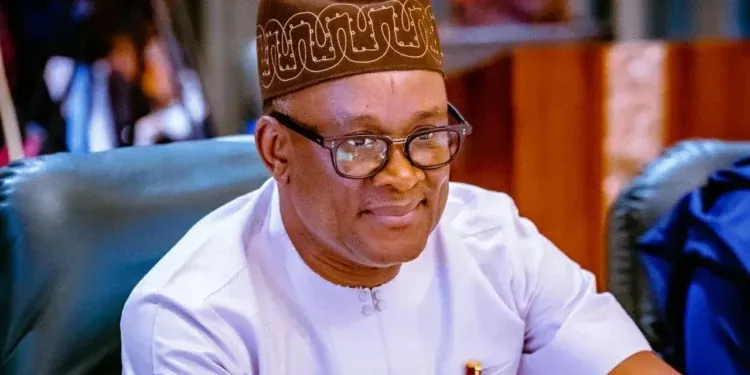Nigeria’s pursuit of industrial self-sufficiency and global competitiveness hinges on a fundamental shift from relying on imported, often outdated, industrial equipment to embracing cutting-edge, domestically produced solutions. This was the core message delivered by Senator John Enoh, the Minister of State for Industry, at the 2025 Nigeria Manufacturing and Equipment/Nigerian Raw Materials Expo. Enoh stressed the urgency of transitioning away from the current practice of importing used industrial scrap, which he characterized as a form of neo-colonialism, and towards deploying world-class manufacturing technologies tailored to Nigeria’s specific needs and focused on resilience and sustainability. This strategic move is crucial to revitalizing the manufacturing sector, which currently contributes less than 10% to Nigeria’s Gross Domestic Product, a figure the government aims to significantly increase.
Central to this transformative vision is the development and implementation of a comprehensive National Industrial Policy. This policy, currently undergoing validation, prioritizes technology adoption, equipment financing, and power integration as the driving forces behind manufacturing innovation. It aligns with President Bola Tinubu’s Renewed Hope Agenda, which emphasizes economic diversification across key sectors such as textiles, automotive, and agro-processing. The policy aims to create a conducive environment for local production by fostering innovation, improving access to finance, and ensuring reliable power supply, all essential elements for a thriving manufacturing sector. The collaborative efforts of the Manufacturers Association of Nigeria (MAN), the Raw Materials Research and Development Council (RMRDC), and other stakeholders have been instrumental in shaping this policy framework.
The government’s commitment to bolstering local production extends beyond policy formulation to encompass a range of supportive initiatives. A planned Made-in-Nigeria campaign, spearheaded by the Pro-Nigeria Secretariat, will promote locally manufactured products through certification, digital marketplaces, and enhanced media visibility. Furthermore, efforts are being harmonized across various government agencies, including the Bank of Industry, the Nigeria Export Processing Zones Authority, the Nigeria Industrial Policy Council, and the National Agency for Science and Engineering Infrastructure, to streamline support for the manufacturing sector. These coordinated efforts are intended to increase access to modern manufacturing technologies, particularly for small-scale producers, through partnerships with development finance institutions and innovation hubs. This will empower Micro, Small, and Medium Enterprises (MSMEs) with the tools they need to compete effectively and contribute meaningfully to the economy.
The 2025 expo itself served as a vital platform for advancing the agenda of industrial transformation. It provided an opportunity for key stakeholders, including government agencies, private sector players, equipment manufacturers, innovation hubs, and academia, to converge and strategize on ways to deepen local production capacity, reduce reliance on foreign inputs, and chart a sustainable industrial future for Nigeria. The Minister urged participants to view the expo not merely as a marketplace but as a launching pad for forging strategic technology transfer partnerships. He encouraged the exploration of modular, mobile, and decentralized equipment models, particularly to cater to the needs of underserved regions. This approach recognizes the importance of adapting technologies to the diverse geographical and economic landscape of Nigeria.
Francis Meshioye, President of MAN, echoed the Minister’s sentiments, highlighting the expo’s significance in translating intentions into concrete innovation and enhancing Nigeria’s industrial competitiveness. He underscored the need to make manufacturing a desirable and attractive sector within the Nigerian economy, emphasizing the importance of sustainable practices and strategic partnerships. The expo’s theme, “Accelerating Sustainable Manufacturing Through Cutting-Edge Equipment and Technology Solutions,” encapsulates the core focus of this transformative agenda. Panel discussions on critical topics such as sustainable innovation, technology transfer, the role of women in manufacturing, and leveraging international partnerships further enriched the discourse and provided valuable insights for stakeholders.
The overarching message from the 2025 expo was a call to action for Nigerian manufacturers and innovators to embrace a new era of industrial development. The Minister challenged participants to collaborate with tertiary institutions to co-design machinery specifically tailored to Nigeria’s unique context. He also urged a redefinition of sustainability, encompassing not just environmental concerns but also industrial sovereignty and inclusive economic development. This vision calls for a holistic approach to industrial growth, ensuring that its benefits are distributed broadly and contribute to the overall well-being of the nation. The expo served as a catalyst for forging the partnerships and strategies needed to reposition Nigerian manufacturing for a future of self-reliance, innovation, and global competitiveness.


